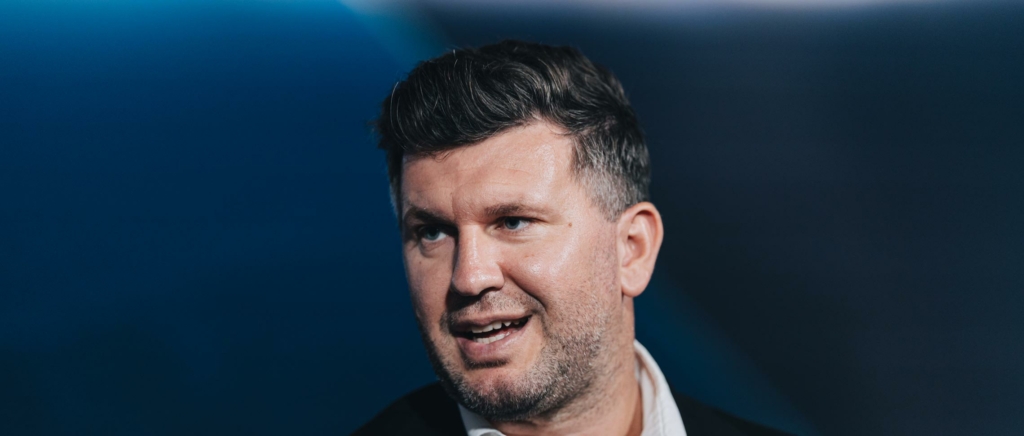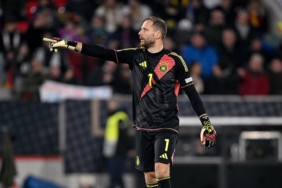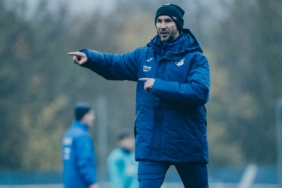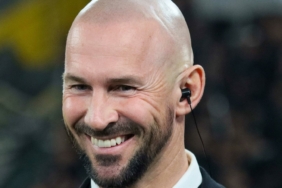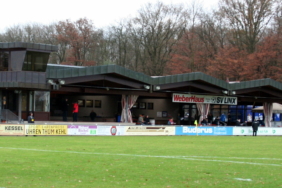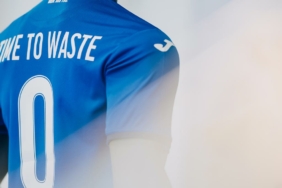A warm welcome to TSG, Andreas Schicker. You had your first day of work in Hoffenheim on 9 October. What was your first impression, how do you assess the first few weeks?
“The first impression, especially in terms of the infrastructure and the sheer size, was both surprising and outstanding. It makes an impact when you walk in and see what feels like 200 faces at the staff meeting and should – in a best-case scenario – remember them all at once. It quickly became clear to me that I should place my initial focus on the professional team. It was and is important that we instill some calm and that I give everyone there the feeling that they have a point of contact again. Many people were clearly waiting for the position to be filled so that they could really get started. Everyone here at TSG is hard-working and wants to achieve the best-possible results for the club, but if they don’t know exactly what direction to go in and how to work, it’s difficult for everyone. That’s why it was important to me that Paul Pajduch and Frank Kramer were appointed to the other positions in the sporting management team at the same time, so that there is also clarity there.”
What did you know about TSG beforehand?
“Many Austrians have always played in Hoffenheim, so it was a club that I have always followed closely in the past. Even back in the first period under Ralf Rangnick, when TSG completely surprisingly became winter champions – which was of course big news in Austria too. The club has always been synonymous with taking a new and courageous approach. I think back to Julian Nagelsmann, for example, who became head coach here at a very young age. And TSG has always been a pioneer when it comes to innovation – think of the Footbonaut or the Helix – and working with data. The club’s approach was and is recognised internationally too. The question now is: how is it possible to rekindle enthusiasm for this in the region? That is also my ambition, my motivation, to get us back there. It should become clearer again what TSG stands for. That requires clear decisions.”
Can you elaborate a little on that? What are your objectives here, both sporting and cultural?
“I believe that the club needs people who generate a lot of energy from within. If you look at the past, at the club’s successful periods, that has always been the case. That’s a very, very important quality at this club: you have to light the fire internally and then transfer it externally. TSG are a club where it doesn’t tend to happen the other way round. So fundamentally, it’s important to ask yourself: How can you achieve this? What kind of football do you have to play? In principle, Hoffenheim’s football has always been very attractive and attacking. If you were to park the bus here with six defenders, it would be really difficult. So you need a clear philosophy of play.”
Is there a desire to implement this style of play not only within the first team, but also within the academy teams?
“The throughline to the academy is a central component. The U19s won the double, the U23s are playing for promotion to the 3. Liga. That’s outstanding. So we should be able to promote players to the first team time and time again and continue to do so. That is also the classic TSG way. In order to increase this probability, my objective in the medium term is to implement this philosophy step by step. It starts with a standardised wording so that everyone knows, for example, what the red zone is, where certain spaces that I have to run into start; so that an U19 players knows what is being said when he moves up to the first team. If everyone at the club speaks the same language, everyone thinks in the same direction, there is a common world, an identity, then it can generate this energy from within. That’s what the club needs.”
You said at your unveiling that your aim was to compete regularly for the European places.
“Of course, it’s not always only about your final position in the table. If you have a team with an average age of 23 and then finish 13th, you also know that it was a transitional year but that something is building for the future. However, if the team has an average age of 28 and finishes 13th, you have a problem. In the future, I repeatedly want to be fighting for a place in Europe with a young team which, in a best-case scenario, is one of the three youngest in the league – and spring surprises that way.”
Recently, the club has obviously had problems in terms of interest. Spectator numbers, for example, have been declining for several years and at the cup tie against 1. FC Nürnberg, the away fans were almost in the majority…
“I’ll be honest: that really shocked me. I don’t think that should happen too often at a home game. At the end of the day, however, the support is of course also very closely linked to the sport. The best campaigns can be launched and the best marketing ideas in the world can be developed. But if it is not working on a sporting level, then it’s difficult. But it will also be fundamentally important to build up a good and emotional connection to the people in the region again so that Hoffenheim fans from the Kraichgau or the Kurpfalz say: ‘I like going there, something is happening there.’ I believe that this can also be achieved in the long term – with the throughline, with young players who make the breakthrough here, who wear their hearts on their sleeves. We have many players who I believe are heading in a good direction. However, a key point will also be to consistently appeal to the fans of tomorrow and get many more young people and children back into the stadium. No stone should be left unturned in this regard. We want to win over young fans. This also includes making the first team much more tangible again. That’s a point that I definitely want to implement, through school tours for example, where you can make much better use of injured first-team players or non-squad players. We as a club must become active and get out there – not the other way round.”
But the quiet environment also fundamentally offers an opportunity.
“Of course. At traditional, emotional clubs like FC Schalke 04 or 1. FC Köln, for example, thousands of people would probably have stood in the square in a delicate situation like the one we had in the summer. We are blessed in this respect. But calm should never mean comfortable; it shouldn’t mean an oasis of well-being. For me, the tranquillity of the surroundings means: We have great conditions here that allow us to work calmly. Young players can develop really well and they know: ‘If I perform here, I’ll go further.’ And we want to open the door for the next stage of their careers. Because we have to be conscious of that in Hoffenheim: We develop young players so well that they can move on elsewhere, that they can take the next step in their career by joining another, bigger club. And at the same time, it is important that the experienced players in the squad, who are of course also needed, always think about success and thus keep moving forward. In the long term, I certainly don’t want to have players who enjoy the peace and quiet above all else.”
But isn’t that an understandable thought?
“The danger is human, I won’t deny that. I experienced it in Graz. We had three or four players in the squad at times who were happy when we won the game at the weekend and knew: ‘Now it’s going to be a quieter week and I can take it easy.’ But in the end, football has to be uncomfortable for you to be successful.”
On the topic of Graz: How do you manage to develop a team like Sturm Graz into a winning outfit that ultimately lifts the double in competition with serial champions RB Salzburg?
“We wrote down clear parameters where we could take steps forward to catch up with RB. We defined these, reviewed them using good analysis and data, and then tweaked the squad accordingly. We knew, for example, that Salzburg were exceptionally strong physically and made it our mission that we absolutely had to get to that level if we wanted to catch up. And in the past two years, we have actually overtaken Salzburg in terms of running performance and physical strength, because we knew and had outlined for ourselves: this is something we can do.”
Because it is a supposedly talent-free aspect.
“Exactly. And we also looked for ‘total machines’ in our scouting operations. (laughs) So we brought in players who were physically strong and could run. We knew that if we overtook Salzburg physically with their brand of football, then things would suddenly look good for us. When we looked at the running data in Graz recently, we generally felt like we had one more player on the pitch and ran between eight and 12 kilometres more than our opponents – especially when it came to intensive sprints. That was something that ultimately set us apart and made us successful.”
Can this be applied to TSG, which has recently defined itself more through a footballing approach?
“Football is constantly developing and the footballing approach should not be lost. But the footballing approach does not mean ‘sluggish ball possession without winning space’. It’s about always being active, a lot of vertical play, going forward at speed, getting into the final third and numerous penalty area situations. That’s how I envisage football, but it also requires the right personnel. I’ll try to be clear in my future decision-making in that regard.”
Is this clarity one of the defining characteristics of TSG Managing Director for Sport Andreas Schicker?
“I experienced it during my playing career when you were waiting for a decision about whether you would extend your contract or not. My personal thoughts at that time were: ‘They should simply speak up, whatever the outcome is.’ That’s why it’s important to me that the players have clarity quickly. It doesn’t matter whether it’s positive or negative, and if necessary you say: ‘Your profile doesn’t fit our idea.’ The player may be disappointed at first but it’s always the better option than delaying such decisions forever.”
How long will it take for the squad to be assembled according to your wishes and ideas?
“It certainly takes three to four transfer periods until you really have a direction and your own ideas are reflected. In the beginning, it’s all about the foundations, the fundamental direction. Then you go into more detail and are much more position-orientated.”
Are there any overarching characteristics that you generally like to see in a squad?
“The general rule in scouting is: young players with special abilities are always top. They can then usually be sold well and at a high price in the future. In any case, it’s better than someone who is already very decent in all parameters. In addition, pace is certainly an attribute that we also need offensively. We are currently very dependent on Bülti (editor’s note: Marius Bülter). We have a good foundation in other areas, with players who are real leaders like Andrej Kramarić, who is very ambitious. Or someone like Oliver Baumann, a super captain who is just as hungry for success. This quality is an important driving force.”
You yourself are just 38 years old, have already been in charge in Graz and are now a Managing Director at TSG Hoffenheim in the Bundesliga. Do you have to be a born leader to do that?
‘I’m generally not someone who enjoys giving negative messages. It affects me, but I am ultimately clear in my decisions. My strength – I believe and hope – is to bring people on board on the way, to give everyone the feeling that we are fundamentally speaking as equals. After that, you have to make the decisions alone in this position anyway, I’m aware of that. But I am ambitious enough that I also lead the way in that respect. And I hope that the people in the region will realise that Andi Schicker wants to achieve something with TSG.”
Did you already have these leadership qualities as a player?
‘I was never the loudspeaker in the dressing room, but I was definitely a quiet leader. I was always on the Team Council in my teams and I was the captain for the Austrian U21s and then at Wiener Neustadt. Even if I wasn’t the first to open my mouth: When I said something, even to the coach, I always had the feeling that it carried weight.”
Is there anything you look for in players now in terms of character?
“I don’t let any players join without a personal discussion. I think I have a good feeling for the person I’m talking to, where I know: Okay, it’s a good fit, or not. Because no matter what the data says, it’s not always about finding the best person, it’s about finding the right person.”

Jetzt 11 Ausgaben kostenlos* abonnieren!
(*jahrliche Bezugskosten nur 18,99 €)

